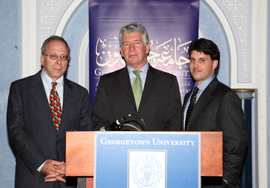CIRS Hosts a Debate on US Presidential Elections

American politics took center stage Sunday night as representatives of the Republican and Democratic parties took the stage at the Diplomatic Club to discuss the 2008 American elections and the future of US politics. The debate, sponsored by the Center for International and Regional Studies, featured professor Gary Wasserman and James Patti representing the Democratic and Republican perspectives respectively.
Never has the result of a political contest had more far-reaching implications for each one of us,” said the debate moderator David Foster, a senior news anchor at Al Jazeera English.
A professor of government at Georgetown’s Qatar campus, Wasserman clearly divided the election into two choices. “80% of America thinks the country is going in the wrong direction,” Wasserman said. “Do we continue to support the party in power, or do we oppose the policies of the last 8 years?” Wasserman pointed to problems such as rising unemployment and the faltering American economy as key indicators of why change is necessary in Washington.
Wasserman, a long-time political strategist, also expressed concern that the American people might believe John McCain’s attempt to distance himself from the White House, even though he has supported the White House in 90% of the Senate votes in the last year and has increasingly softened his views to make them more acceptable to a conservative base.
“McCain was a fighter pilot. He is used to flying up there by the seat of his pants, making decisions on intuition,” Wasserman replied. “Obama started life as a community organizer. He’s used to sitting through endless meetings. Trying to reach compromise, trying to negotiate. That’s the perspective that he’ll bring to this.”
A delegate for the state of Rhode Island to the 2008 Republican National Convention, Patti framed the Republicans not as the party of George W. Bush, but as the party of Abraham Lincoln, limited government and free trade. He pointed out that Americans must ensure that their leaders must demonstrate wisdom, leadership and experience. One must also look at a candidate’s stance on major issues of the day. “The US is a center-right nation, and a democrat promises a hard-left turn that is not acceptable to most Americans,” Patti said. “He (McCain) will prove most acceptable to a majority of Americans.”
Patti, currently serving as the Director of Strategic Planning and Analysis at Brown University, discussed McCain’s historical record as a consensus builder that has reached across the aisle to pass legislation. He also mentioned McCain’s leadership in calling for changes in the Iraq war strategy as early as 2003, as well as McCain’s early support of the troop surge in Iraq which has been widely credited with reducing casualties in the country.
In discussing US foreign policy, the conversation quickly turned to the question of American support of Israel. Audience members questioned each party’s stance on the issue, and both sides claimed to have the authority and background to manage the question of peace between Palestine and Israel. “Powell was the first Secretary of State to utter the word ‘Palestine,’” Patti said. He also blamed the Clinton administration for waiting until the waning days of the administration for trying to strike a peace deal.
Wasserman countered by supporting Clinton’s effort to put “all the power of the presidency” behind a peace deal. He also criticized the Bush administration for waiting until the waning days of its presidency to make a serious effort at bringing sides to the negotiating table.
On a question regarding placing Sarah Palin as the Vice Presidential nominee on the Republican ticket, Patti admitted that he was surprised at first. “But it makes sense,” he said. “She is the most popular governor in America.”
The debate certainly stirred emotions among the crowd. Many McCain and Obama supporters attended the debate dressed to support their respective candidates. Audience members also posed a variety of questions on the Israel lobby, the war in Iraq and which candidate was most capable of stopping the continuing economic downturn in which America is currently embroiled.
In a closing statement, Patti urged the audience not to put faith in the current polls that show Obama leading the race by 5-6%. “He will govern as his own man,” Patti said. Patti declared that McCain would maintain a philosophy of reform in Washington, global prosperity, and promoting peace in the world. He urged voters to reflect on whether Obama’s experience is enough to allow voters to trust Obama to lead the country through the trying times ahead. “Why not elect McCain for one term so that Obama can gain more experience?” Patti said.
Wasserman presented Obama’s candidacy as a historic moment for America. “When America is willing to elect a black man as president, that says something about how far we’ve come,” he said. “We have a chance to choose a leader that, both in words and appearance, embraces our global community. We need to turn the page.”
CIRS has announced that the next installment of its Distinguished Lecture series will feature Hanan Ashrawi on 1 December at 6:30pm at the Diplomatic Club.